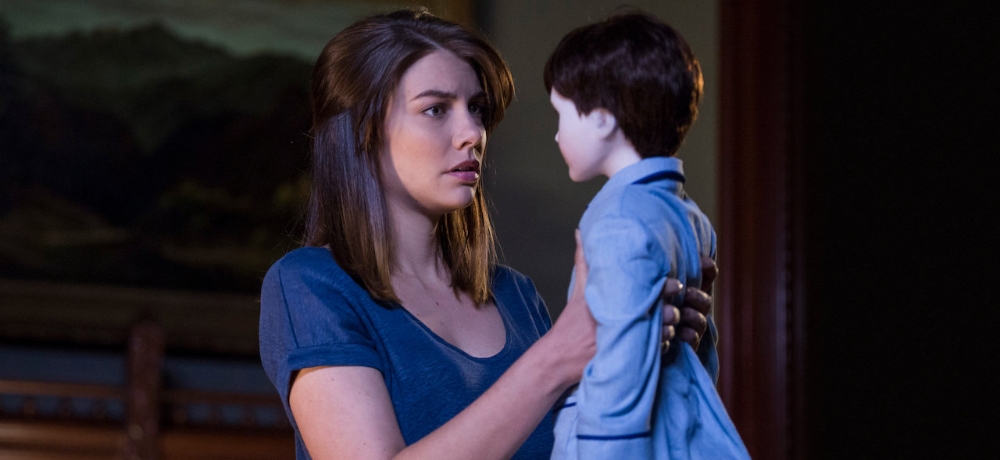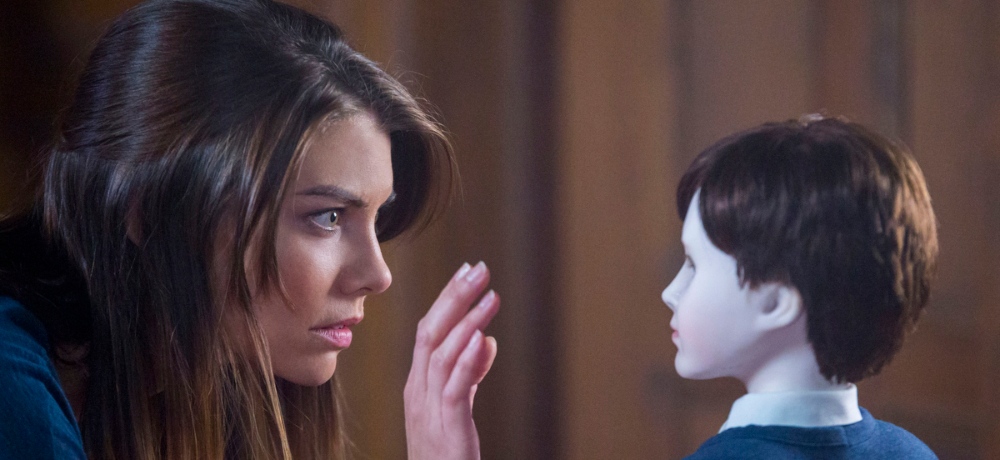


On the surface, William Brent Bell’s 2016 film The Boy may not readily appear to be a terribly female-centric story (outside of starring a female lead, but that doesn’t really make it stand out). A creepy doll tormenting the occupant of a massive, empty mansion is a story that could really happen to anyone. But when you dig a little into the text of the film, it offers a distinctly female perspective as its events unfold.
In The Boy, Greta (Lauren Cohan) travels from the U.S. to England to take on a nanny position for a family with a young boy named Brahms. Well, what she assumes is a young boy. In reality, the Heelshires are something of an odd group. Their real son had passed away years ago, and the couple has had a bit of difficulty moving on. Greta is actually being hired to care for a doll designed in the late Brahms’ likeness. She accepts this truth, strange as it may be. The couple is grieving, but the offer is still good, and Greta is looking for a fresh start.
The Heelshires depart for a long-awaited vacation and soon, strange things begin occurring in the large house. Objects disappear, Brahms moves around by himself, and Greta senses that she may not be alone. Eventually, Greta is left with no choice but to conclude that the real Brahms is still around, in some way. Perhaps possessing the doll that was made in his visage, or maybe just hovering near it as a restless spirit. Either way, she begins to see Brahms less as an empty doll and more as a representation of the child himself. (Yes, we know there’s more to the story than that, but we’ll get there.)
We eventually learn that part of Greta’s reason for taking this job is the fact that she is escaping some particularly painful trouble in the U.S. She had been involved with a man named Cole (Ben Robson), who had abused her repeatedly. When she became pregnant, she had hoped that he would change. He swore he would, and for a while, things seemed okay. However, it was not to last. Cole lapsed into his abusive patterns and beat Greta so badly that she ended up losing the baby. It was this event that ultimately led to her breaking it off with Cole for good, and fleeing to the U.K. for some distance.
At first glance, it might seem a little strange that Greta became so attached to this doll. It’s insanely creepy, and the idea of a ghost child hanging around it doesn’t really do much to defuse that feeling. But for Greta, who is still mourning the loss of a child, seeing a little boy under the surface of a porcelain doll and being able to care for him may be the most logical step in the world. She is looking to fill the void that was left when she miscarried, and Brahms is looking for love and care. It seems the most natural fit.
When she begins to view Brahms in this way, she stops seeing the doll as a strange object, and starts seeing him as the child that he once was. She goes through his daily routine and obeys the house rules to the letter, giving him the experience and the care that he seems to want. Brahms, seemingly satisfied, stops acting out. The strange occurrences she had earlier noted stop, now that Greta is playing her role as caretaker. Greta, in turn, seems to find peace at last in her new job, as she feels that she is giving a lost little boy the care and nurturing that he needs.

This fragile peace gets upended when Cole unexpectedly shows up one evening, having finally managed to track Greta down. He tells her that he has a new job, and that things are going well, and that he has a ticket for her to return to the United States with him the following day. As strange as he thinks it is that Greta is being paid to babysit a creepy little doll, he is ultimately relatively pleased with the scenario, because it makes it that much easier for her to leave with him.
Greta plays the whole conversation as cool as she can. She is obviously not happy to see Cole and has no intention of going home with him, but she does her best to keep things on an even keel, to avoid arousing his anger. After all, she’s alone in this country house, miles from the village. As she gets Cole set up on a downstairs couch for the night, he tells her, “I’m sorry for what happened. I just need to know that you forgive me.” Like so many abusers, his apology is perfunctory at best, and he doesn’t ask for her forgiveness. He expects it. Cole is a grade-A douchebag.
Later that night, Greta is awakened by the sound of Cole screaming angrily from downstairs. When she goes to investigate, she sees that Brahms has moved from the upstairs bedroom into the billiards room, where Cole had been sleeping. Above the couch, the words “GET OUT” have been written in blood.
Cole is incensed, and when Greta tries to explain that the doll is not simply a doll, Cole only gets angrier. He grabs Brahms from the corner where he had been sitting (watching the whole scene with his empty glass eyes). He slowly swings the doll from side to side as Greta begs him to put Brahms down. He then gives the doll a mighty heave and smashes it against a chair, sending porcelain and glass flying in every direction, while a helpless Greta looks on.
Now, of course the doll is just a doll. Even if the spirit of Brahms were inhabiting it, that doll was just a vessel. Brahms himself would in no way be hurt by Cole’s actions. But that isn’t what has Greta upset, and it is much more precise than what she is thinking. As this horrifying scene plays out, she realizes that she is about to lose another child to her abusive ex. That once again, she is unable to protect a child from the violent rage of Cole.
It’s really a heartbreaking moment, especially in light of how caring for Brahms has helped Greta to nurse her own wounds and begin to heal from the loss that made her leave Cole in the first place. And now here he is again, undoing that healing and making her suffer that loss for a second time. Cohan plays this scene perfectly, really digging into the fear that Greta is experiencing and the sense of doom that she knows is coming and is powerless to stop.
This is the moment where the real, very much alive and very grown-up Brahms bursts out of the wall and takes his rage out on Cole (it’s fine—nobody is going to miss Cole), before we launch into the grand finale of the film. Everything moves pretty quickly after that, but the moments leading up to it almost crawl to a stop, as we see the pain that Greta is once again enduring at the hands of her abuser.
On its surface, The Boy doesn’t really have the hallmarks of a female-centered film. It’s another story of a creepy doll (historically, always a safe bet and a win, in my book). But this one goes the extra mile in giving our protagonist a real, logical reason for connecting with Brahms in the way that she does. At the beginning, she's a little creeped out by him (as we all are), but as she begins to bond with Brahms (the spirit that she believes him to be), she starts to see him differently, and through that relationship, her trauma begins to heal. It gives the film a welcome depth that might not be immediately noticeable on the surface, but really goes a long way in enriching the story.